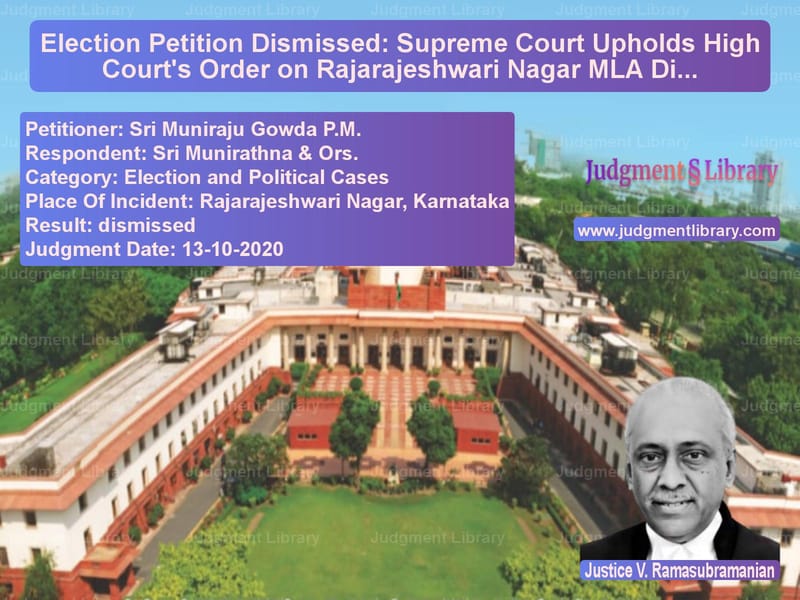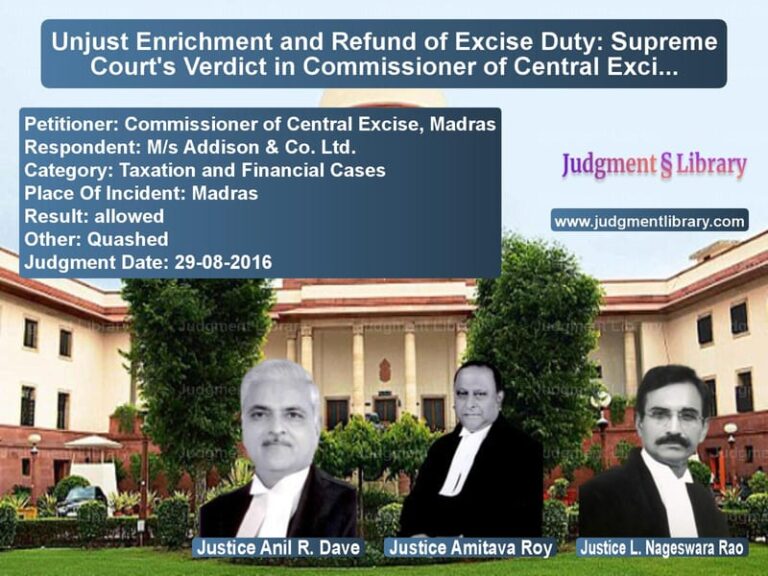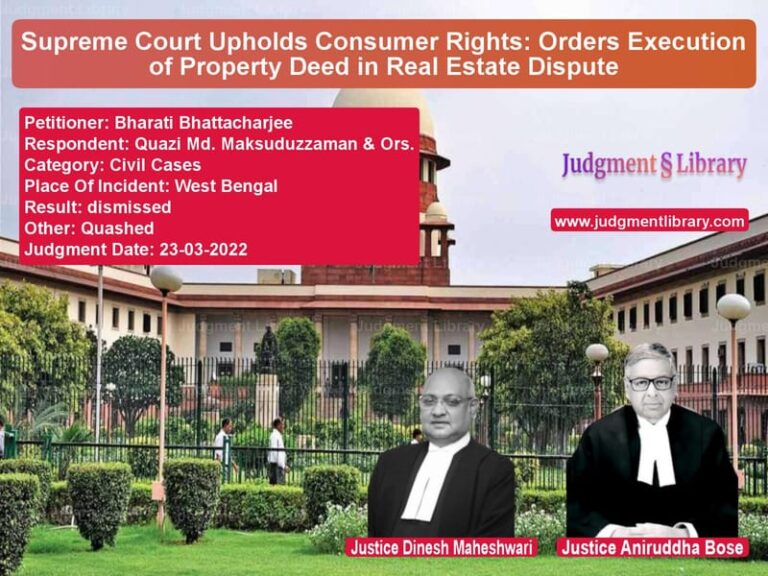Election Petition Dismissed: Supreme Court Upholds High Court’s Order on Rajarajeshwari Nagar MLA Disqualification
The case of Sri Muniraju Gowda P.M. vs. Sri Munirathna & Ors. is a crucial Supreme Court ruling regarding the disqualification of a legislator and the validity of election petitions. The Court addressed whether an election petition remains relevant after the disqualified candidate ceases to be a member of the legislature.
The judgment clarifies that an election petition seeking disqualification of a candidate becomes academic if the candidate is already disqualified by the Speaker under the Tenth Schedule of the Constitution. Additionally, the Court reaffirmed that election petitions must strictly comply with the provisions of the Representation of the People Act, 1951.
Background of the Case
The case pertains to the Rajarajeshwari Nagar Assembly Constituency (No. 154) in Karnataka. In the 2018 Karnataka Legislative Assembly elections, the first respondent, Munirathna, was declared elected.
The petitioner, Sri Muniraju Gowda P.M., filed an election petition challenging the election of the respondent on various grounds, including corrupt practices under Section 123 of the Representation of the People Act, 1951. However, during the pendency of the petition, Munirathna and 12 other MLAs resigned from the Karnataka Legislative Assembly, leading to their disqualification.
Legal Issues and High Court Proceedings
The key legal issues before the High Court included:
- Whether the election petition remained relevant after the respondent’s disqualification.
- Whether the election petitioner had provided sufficient material facts to establish claims of corrupt practices.
During the proceedings, multiple interlocutory applications were filed by both parties:
- The returned candidate (respondent) filed applications seeking to strike out certain pleadings and dismiss the election petition for lack of substratum.
- The election petitioner sought to amend his petition and introduce additional pleadings.
By an order dated 20 March 2020, the Karnataka High Court:
- Partly allowed the election petitioner’s request for amendment.
- Fully allowed the petitioner’s request to produce additional documents.
- Rejected the returned candidate’s applications to dismiss the election petition.
- Allowed the respondent’s request to strike out certain prayers in the election petition.
Petitioner’s (Sri Muniraju Gowda P.M.) Arguments
The election petitioner argued that:
- The respondent’s election was invalid due to corrupt practices under Section 123 of the Representation of the People Act, 1951.
- Despite the respondent’s subsequent disqualification, the election petition remained valid.
- He was entitled to be declared elected in place of the disqualified candidate.
- The High Court erred in striking out parts of his petition.
Respondent’s (Munirathna) Arguments
The returned candidate countered the claims by arguing:
- The election petition had become infructuous due to his disqualification.
- The petitioner’s pleadings were insufficient to establish claims of corrupt practices.
- The High Court correctly struck out prayer (c), which sought to declare the petitioner as the elected candidate.
- There was no merit in the allegations of electoral malpractices.
Supreme Court’s Observations and Judgment
The Supreme Court, in its ruling authored by V. Ramasubramanian, made the following key observations:
- Election Petition Becomes Academic: Since the respondent had already been disqualified, the relief sought in the election petition (setting aside the election) was no longer relevant.
- Lack of Material Facts: The petitioner failed to plead material facts under Section 101 of the Representation of the People Act to justify a declaration that he should be elected in place of the disqualified candidate.
- Striking Out of Prayers Justified: The High Court was correct in striking out prayer (c) in the election petition since the election petitioner had not provided a legal basis for claiming the seat.
- Corrupt Practices Require Strong Evidence: The Court reaffirmed that allegations of corrupt practices must be specific and supported by evidence.
The Court cited precedents including:
“Mere allegations of corrupt practices without supporting material facts cannot be the basis for setting aside an election.”
“An election petition must contain concise statements of material facts and must establish that the petitioner was entitled to be declared elected.”
Final Judgment
The Supreme Court ruled:
- The Special Leave Petition filed by the election petitioner was dismissed.
- The High Court’s order striking out portions of the election petition was upheld.
- The petitioner had no legal claim to be declared as the elected representative.
- Corrupt practice allegations were not supported by adequate pleadings.
Conclusion
The Supreme Court’s judgment in this case clarifies important legal principles regarding election petitions and the consequences of disqualification. The ruling establishes that an election petition becomes academic if the respondent is disqualified through other legal means. It also underscores the necessity of providing specific material facts when alleging corrupt practices.
The decision reinforces procedural fairness in election disputes and upholds the rule of law by ensuring that courts do not entertain speculative claims without substantive evidence.
Petitioner Name: Sri Muniraju Gowda P.M..Respondent Name: Sri Munirathna & Ors..Judgment By: Justice V. Ramasubramanian.Place Of Incident: Rajarajeshwari Nagar, Karnataka.Judgment Date: 13-10-2020.
Don’t miss out on the full details! Download the complete judgment in PDF format below and gain valuable insights instantly!
Download Judgment: Sri Muniraju Gowda P vs Sri Munirathna & Ors Supreme Court of India Judgment Dated 13-10-2020.pdf
Direct Downlaod Judgment: Direct downlaod this Judgment
See all petitions in Public Interest Litigation
See all petitions in Legislative Powers
See all petitions in Judgment by V. Ramasubramanian
See all petitions in dismissed
See all petitions in supreme court of India judgments October 2020
See all petitions in 2020 judgments
See all posts in Election and Political Cases Category
See all allowed petitions in Election and Political Cases Category
See all Dismissed petitions in Election and Political Cases Category
See all partially allowed petitions in Election and Political Cases Category







